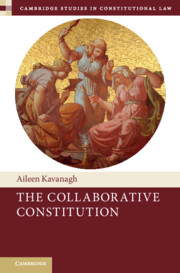Book contents
- The Collaborative Constitution
- Cambridge Studies in Constitutional Law
- The Collaborative Constitution
- Copyright page
- Brief Contents
- Contents
- Acknowledgements
- Abbreviations
- Introduction
- Part I Institutions and Interactions
- Part II Rights in Politics
- Part III Judge as Partner
- Part IV Responsive Legislatures
- 11 Underuse of the Override
- 12 Declarations, Obligations, Collaborations
- Conclusion
- Bibliography
- Index
- Books in the series
11 - Underuse of the Override
from Part IV - Responsive Legislatures
Published online by Cambridge University Press: 12 October 2023
- The Collaborative Constitution
- Cambridge Studies in Constitutional Law
- The Collaborative Constitution
- Copyright page
- Brief Contents
- Contents
- Acknowledgements
- Abbreviations
- Introduction
- Part I Institutions and Interactions
- Part II Rights in Politics
- Part III Judge as Partner
- Part IV Responsive Legislatures
- 11 Underuse of the Override
- 12 Declarations, Obligations, Collaborations
- Conclusion
- Bibliography
- Index
- Books in the series
Summary
This chapter examines the power of the legislature to have ’the last word’ under section 33 of the Canadian Charter of Rights, and the UK Human Rights Act 1998. In both cases, the democratically elected legislature is empowered to legislate notwithstanding rights. Whilst both of these provisions have been hailed as the lynchpin of a New Commonwealth model of constitutionalism, or as an instance of weak-form review, this chapter observes that they have hardly ever been used. The task of the chapter, then, is to examine and explain ’the underuse of the override’. Departing from the dominant narrative that the legislature wanted to use the override but was thwarted by exogenous political costs, this chapter argues that the rare use of the override was part of the original design of both systems from the outset. Instead of being a tragic thwarting of democratic dialogue, or an unfortunate atrophy of constitutional powers, rare use of the override was a feature, not a bug in both systems. Supplementing the historical narrative with normative argument, the chapter defends the rare use of the override as a vindication of the collaborative constitutional ideal.
Keywords
Information
- Type
- Chapter
- Information
- The Collaborative Constitution , pp. 333 - 362Publisher: Cambridge University PressPrint publication year: 2023
